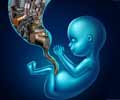Babies of mothers who are malnourished during pregnancy may experience faster cognitive decline later in life, a study published Monday found.

During the five to six months of famine, the Dutch population's daily rations dropped to as little as 400 to 800 calories, said the study, published in the Proceedings of the National Academy of Sciences of the United States.
While mild calorie restriction in adults can postpone aging and increase lifespan across many species, "caloric restriction occurring before birth has various negative effects on mental and physical health later in life," the study says.
In the study, 64 seniors who were exposed to famine in the early stages of gestation did worse on cognitive-function tests that required them to do tasks like name the color of the word "blue" when it was printed in yellow ink, than seniors who were exposed later or not at all to hunger in utero.
The researchers also found that exposure to famine at any stage of the mother's pregnancy resulted in a smaller head circumference at ages 56-59.
"Head size is related to brain size and reduced size has been associated with decreased cognitive abilities in the elderly," they wrote.
Source-AFP
 MEDINDIA
MEDINDIA



 Email
Email





